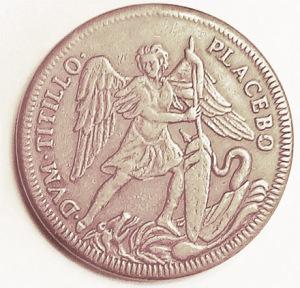 Once traveling with my family through Philadelphia Airport, I encountered an acquaintance, and introduced my little daughter to him as the King of Bermania. I guess it made an impression on her young mind.
Once traveling with my family through Philadelphia Airport, I encountered an acquaintance, and introduced my little daughter to him as the King of Bermania. I guess it made an impression on her young mind.
Fast forward a dozen years or so. She showed me a draft of her college application essay. About travel broadening one’s horizons or something. Mentioning how, in an airport, she’d once met a king. “Ahem, Elizabeth,” I said. “You see, that was actually . . . ”
Allen Berman. A fellow coin dealer. He also goes by Alanus I, King of Bermania. But that’s all in fun. Though it’s very elaborate fun.

As its opening explains, Bermania is a (very) small old kingdom somewhere in Eastern Europe; whose name does not actually derive from his own. It seems the land’s early inhabitants had a thing for lawn ornaments. One fellow displayed a large wooden bear.

But Bermania is a very small country indeed. Even smaller than Grand Fenwick. As the author notes, the kingdom avoided Napoleon’s armies by hiding behind a tree.

The book is basically a history of Bermania and its quasi-yiddische people. Interwoven with the history of Europe and indeed the rest of the world. For example, few people know that General Tso’s chicken is actually more a Bermanian dish than a Chinese one.
The stories are amusing. Perhaps not S.J. Perelman hilarious — but amusing. There’s mention of “[w]hen the famous flying saucer arrived in 654 A.D.” Note this was the famous one.
Numismatics is never far from the author’s mind. One of the stories concerns what are called royal touch-pieces. This was an actual thing, in pre-modern Britain, whose people believed a certain nasty illness (scrofula) was curable by the King’s touch. In connection with these touch ceremonies they minted coin-like “touch-pieces,” often holed and worn on a ribbon around the neck. In the case of Bermania, the malady to be cured was glumness, the monarch administering the remedy of jokes and ticklings. So the Bermanian equivalent of the touch-piece was the tickle-token. Allen had restrikes made; some years ago he gave me one with the request that I carry it in my pocket so eventually he could see what it would look like with natural circulation wear. This was pure Allen. Actually, I didn’t know why he couldn’t do it himself; but flattered by this royal trust, I have performed it faithfully till the present day.

After WWII, like several countries in its neighborhood, Bermania suffered Communist occupation. Then there was the “fig revolt” in the ’70s, resulting in a delegation of Bermanian dignitaries dispatched to Bridgeport, Connecticut, their archaic costumes causing them to be initially mistaken for trick-or-treaters confused about the calendar. They may also have been confused about Bermanian royal genealogy. The book unfortunately omits detailing the Bridgeport connection. In any case, these Bermanian emissaries were under the impression that a 14-year-old kid there was the rightful heir to the throne. This was Allen, later Alanus I. (Earlier Bermanian monarchs had much sillier names.)

Still and all, humanity has outgrown monarchical government. Bermania should become a democratic republic.
